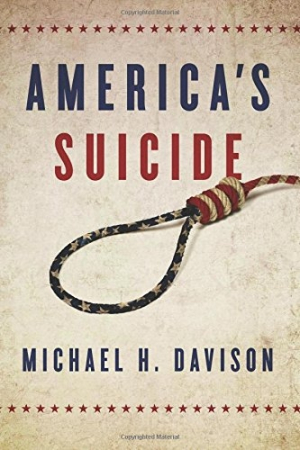
America's Suicide
Davison aims at what he believes is wrong with American society, economics, and politics, and how to fix it.
America’s Suicide is a provocative book that makes for disturbing reading, as Michael H. Davison sets out to demonstrate why he believes the United States is on the wrong track and proposes a few solutions.
Davison has a solid command of language and writes well in presenting his argument. He points directly to a combination of “more powerful and intricate government controls” and two population groups, which he describes as “slackers” (“helpless and dependent types”) and “demagogues” (“dominating, aggressive, deceitful, born-to-rule types”).
While the book is inclusive in its condemnation, it seems largely to be a diatribe against liberals and progressives, whom the author closely associates with socialists. A good deal of time is spent debasing socialism, suggesting that the US population is moving the country toward becoming a socialist state while demonizing capitalism. “American collectivists (liberals, socialists and communists) cannot allow themselves to admit that the ‘capitalist’ straw man they so roundly condemn emerges solely out of their own fantasies,” writes Davison.
Interestingly, the author is not a fan of either political party. He writes, “The Republican and Democratic Parties have foisted on the American people the alternatives of religion or the welfare state or some mix of the two, grim choices for those precious few of us who do not want either one.” In this regard, America’s Suicide includes an exercise with an intriguing outcome: The author combines what he believes are the best qualities of the Democratic and Republican parties into a new party he calls “The Rational and Responsible American Party” and details fourteen principles. Three of them are: “Government fiscal prudence and permanently balanced budgets with provisions for impeachment for violation,” “Gradually shrink the parental state except for those judged in court to be truly helpless with no other recourse,” “Gradually eliminate the Federal Reserve and create no other central bank.”
The author writes with a certain eloquence and strength, channeling the anger and frustration of a portion of the American population. Yet America’s Suicide comes across largely as one person’s moral outrage. Highly critical of certain aspects of America’s current state, the book seems to view things in absolutes with little room for shades of gray. While some notes are appended to each chapter, missing are recommended reading, additional resources, and a bibliography, all of which would have enhanced the book’s credibility.
America’s Suicide is likely to be viewed by progressives and moderates as controversial if not highly charged, while conservatives and those on the right might be more receptive to the book’s message.
Reviewed by
Barry Silverstein
Disclosure: This article is not an endorsement, but a review. The publisher of this book provided free copies of the book and paid a small fee to have their book reviewed by a professional reviewer. Foreword Reviews and Clarion Reviews make no guarantee that the publisher will receive a positive review. Foreword Magazine, Inc. is disclosing this in accordance with the Federal Trade Commission’s 16 CFR, Part 255.
